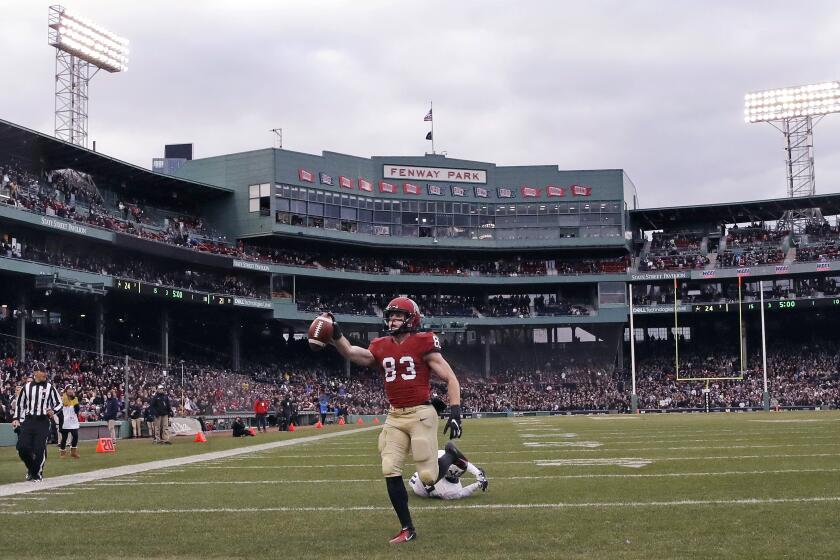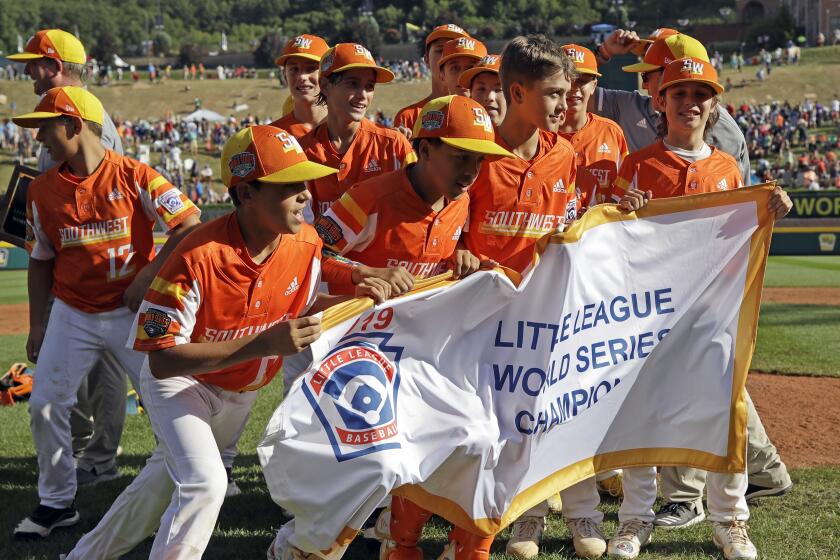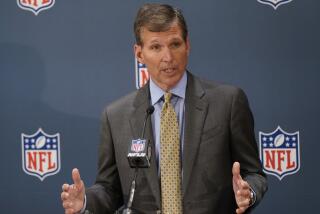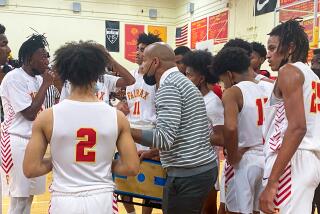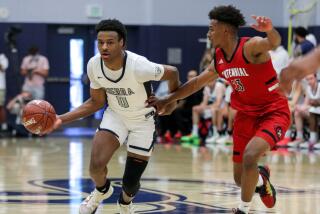Youth baseball tournaments struggle to adhere to health and safety guidelines
- Share via
The guidelines called for parents to give one another space. For players to limit physical interaction. For coaches to stand farther away during huddles and mound visits. For baseball to be played at a safe social distance.
But during a recent travel tournament for 14-year-olds at the Texas Rangers spring training facility in Surprise, Ariz. — one that included 17 California-based teams and mirrored so many other youth sporting events making their return around the country in recent weeks — most parents still clustered together in tiny pockets of shade, many players still slapped hands between at-bats, and only a handful of attendees donned masks during a blistering summer afternoon.
If not for a plastic shield in front of the snack bar, it would have been easy to forget there was any pandemic at all.
“We try to make sure that people will follow [rules] to the extent we can,” said Brad Clement, CEO of Perfect Game USA, the organization that staged the event in Arizona. “But because it is uncharted, it’s impossible to know for sure.”
Chris Hinton and his wife started College Football Parents 247 that aims to bring parents to the table, so to speak, to be able to advocate for their sons with the NCAA.
Though a challenge for all sports, this compliance conundrum has become particularly pertinent in the largely self-governed world of youth sports — where widespread testing requirements are impractical; oversight varies widely from tournament to tournament; and coaches, players and parents are typically trusted to follow guidelines on their own.
“There’s no governing authority in youth sports,” said Jon Solomon, editorial director of the sports and society program at the Aspen Institute, which has closely studied the pandemic’s effects on youth sports. “There are a lot of well-intentioned sports organizations that have put out really thoughtful guidelines and rules for their specific sport and sports in general. But it’s still up to each organization to apply it as they see fit on the ground.”
Critics have called into question whether youth sports are truly safe to return, especially as national COVID-19 cases continue to rise. They fear the industry is returning too fast, that financial factors and parental pressure are taking precedence over best possible practices.
“If you’re an elite travel sports team that has been missing out on really high tournament fees or registration fees for a number of months, some of them are pushing the envelope, being a little more aggressive returning,” Solomon said of an industry he said was estimated to be worth more than $19 billion.
The 2020 Little League World Series has been canceled because of concerns over COVID-19. Local leagues are encouraged to play regular seasons.
“For a lot of them, particularly travel sports clubs and tournaments, this is their livelihood,” he added.
Travel tournaments that bring together teams from several states have caused particular concern. Dr. Alison Brooks, who specializes in pediatric and adolescent primary care sports medicine at the University of Wisconsin, said such events “should not be happening.”
“You should be staying in your local community,” she added. “Playing within your own team or league or people in your immediate area.”
Some sports, especially in-season ones such as baseball and softball, are staging events in markets where local governments permit it. In addition to travel team tournaments, Little League seasons in several states — but not California — are underway. On its website, Little League recommends that local leagues adhere to the guidelines set forth by state and local officials.
“We do believe there is great value in our young people being able to get out and do what they enjoy doing in an energetic and hopefully safe and healthy way,” said Clement, whose Perfect Game organization has staged more than 100 tournaments since late May. “It’s just better when we can get to that point.”
There have been limitations. Most youth sporting events within California remain postponed. Tournaments in Arizona, including Perfect Game events through the end of July, have been postponed. USA Baseball’s National Team Championships scheduled for late July and early August in Arizona and Florida were canceled last week. USA Softball COO John Miller said that sport’s governing body called off close to half of its national championships.
Organizations that typically stage travel baseball tournaments throughout Southern California such as USSSA, Triple Crown, Baseball Factory and Prep Baseball Report are shut down primarily because very few fields are open.
But in many other corners of the country, youth sports continue to push on, putting an onus on coaches and staff to adhere to guidelines.
“I feel like I’m a sergeant at times,” said Edgar Garcia, who coaches the Pasadena-based PFA Matadors club baseball program, one of the participants at the Surprise, Ariz., event. “As a coach, I have to make sure they are following the rules.”
Before his team’s trip to Arizona, Garcia pleaded in an email for his team’s parents to use masks and stay separated. During games, he issued constant reminders to his players — “Don’t high-five, don’t chew gum, don’t share water, don’t sit too close!” — that had little to do with baseball.
But whenever he looked around the four-field complex, he saw other teams failing to take precautions seriously.
“It’s frustrating,” he said. “That’s what’s wrong with the world, right? We’re all trying to do our part, and there are those people that don’t care, that are fighting to not wear a mask. I mean, how difficult is that?”
The benefits of getting young people back into sports are obvious, especially after months of mostly limited social interactions and physical competition. But Brooks and Solomon believed more cautious approaches, such as a localized tiered return instead of large-scale travel tournament play, could create the same effect.
“It likely is not going to be the way they were playing the sport before the pandemic,” Brooks said. “So that’s where you’re hoping coaches and parents and leagues manage expectations.”
Added Solomon: “In a lot of ways, it just reflects much of our society. Some of us in society are reopening very quickly, sometimes too quickly. Some of us are being more cautious and going through the appropriate guidelines.”
More to Read
Get our high school sports newsletter
Prep Rally is devoted to the SoCal high school sports experience, bringing you scores, stories and a behind-the-scenes look at what makes prep sports so popular.
You may occasionally receive promotional content from the Los Angeles Times.

